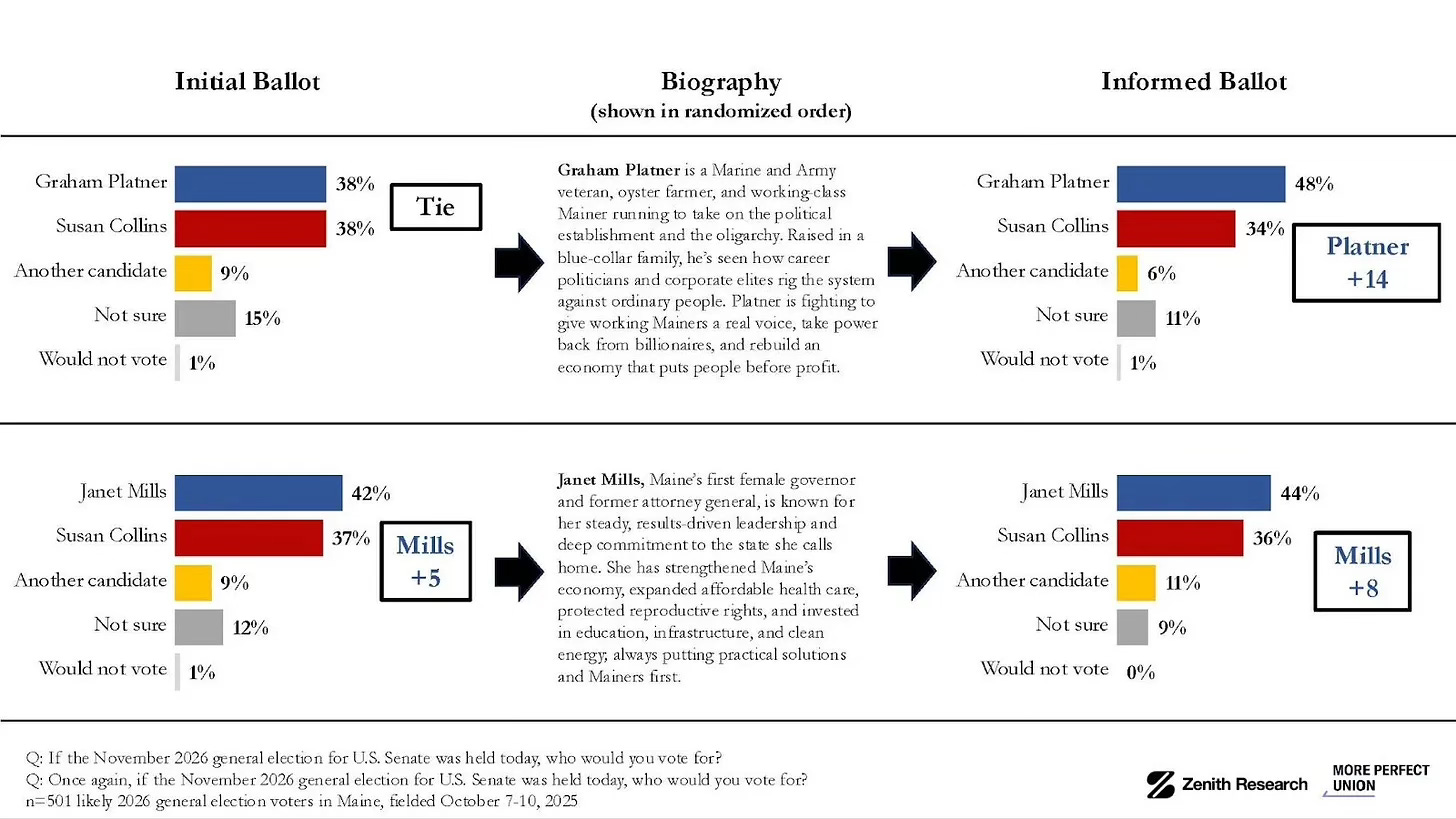Can Democrats Actually Flip Maine?
There’s reason for optimism this time, balanced by the reality of what happened in 2020.
How many times do we have to go through this? Everyone on the Democratic side says (or wants to believe) that Susan Collins is one of the “most vulnerable” incumbent senators in the country, and then the moderate blue-state Republican goes on to thump her opposition election after election (+17 in 2002, +23 in 2008, +37 in 2014, and even +9 in 2020).
Democratic hopes were particularly misplaced last cycle, with the party pumping an absurd $70 million into the campaign of Sara Gideon, more than twice the amount raised by Collins, only to see the former state house speaker lose 51 percent to 42 percent in a year when Joe Biden defeated Donald Trump by an identical nine points in Maine.
The Maine Senate race in 2020 had one of the worst polling errors of any election in the country. All pre-election polling predicted that Gideon would defeat Collins, with some surveys showing double-digit leads for her heading into Election Day. But this polling was uniformly awful. Why? Maine’s electorate is 61 percent white working class, one of the highest percentages in the entire country and one of the hardest demographic groups to survey properly. This detail alone goes a long way to explaining why Collins is consistently underestimated in the state.
Now, roughly a year out from the 2026 election, here we are again with heightened Democratic hopes and new polling purportedly showing Collins’s vulnerability. A survey of 500 likely Maine voters, conducted by organizations supporting Democrat Graham Platner, a veteran and oyster farmer, shows Collins tied with Platner in a straight ballot test (38 percent to 38 percent with 15 percent undecided) and losing to recent entrant and current Maine Governor Janet Mills (37 percent to 42 percent with 12 percent undecided). Since more than half of Maine voters don’t know Platner, the groups tested informed biographies (below), showing a shift in his direction with both Democrats hypothetically beating Collins by +14 points and +8 points, respectively.
Keep in mind this new poll is an entirely speculative exercise conducted by people with a stake in intra-factional fights in the Democratic primary. But the bios above are defensible and even-handed presentations of the two main candidates, and theoretically both Democrats could defeat Collins given her current poor standing, with Platner poised to do somewhat better according to this research.
(Personally, I have no stake in this contest, but if I could vote in the Maine primary, I would probably choose Platner because he’s precisely the kind of candidate that Democrats need to refresh their tired party. But who knows, maybe he turns out to be a dud, and maybe Maine Democrats will believe Mills or someone else is a more sensible choice. We don’t have any reliable primary polling at this point to gauge voters’ leanings but given Mills’s success and name recognition statewide it is safe to assume she starts ahead.)
Collins’s lackluster position in Maine right now is not surprising given the larger context of the unpopular Trump presidency in a state that voted for Kamala Harris. More neutral polling reveals that Collins’s favorability is underwater (-16 favorable minus unfavorable in the second quarter of this year), whereas Governor Mills’s popularity with state voters is more robust and slightly above water.
The problem for any Democrat from any faction in Maine this year is that if they are honest with themselves, they know that Collins’s position will not be this poor come next year (assuming she stays in) and that their own position is undoubtedly inflated. Her final numbers almost always exceed her pre-election polling mostly due to survey errors, and she remains in a strong position to deliver for her state from her perch as Chair of the Senate Appropriations Committee.
Democrats also know that they realistically cannot retake the Senate without flipping Collins’s seat. However, even though the political context is bad for the incumbent party and Collins is not as popular as she used to be earlier in her career, she is a resilient legislator who absolutely should not be counted out. Democrats have been claiming for years that she stands for Trump and D.C. over Maine, and then Maine voters return her to office.
Criticisms of Collins alone haven’t worked. The Democrats’ national brand problem in a state with heaps of working-class voters will dog the party’s eventual nominee regardless of whether they are an insurgent or an establishment figure.
You don’t need another poll to tell you that.





I'm an unaffiliated voter from CT. I wish I had a moderate senator in CT like Susan Collins instead of the two radical loons Chris Murphy and Richard Blumenthal that are there now. Go Ms. Collins, go!
I’m in Texas, dreading our Senate choices next year, and believe John Cornyn has been a hard working, bipartisan legislator, which is why he was censured and may lose our GOP primary. Senator Collins has also been a hard working, bipartisan legislator. The Senate will be worse off without her there. She has worked well with Patty Murray on appropriations and HAS spoken out against Trump and Vought rescissions. No other Mainer can replace Collins’ knowledge, skill and seniority in the Senate. Our country needs more centrist Senators willing to cross the aisle to solve problems. If a D wins, I hope they are more like Angus King and Janeane Shaheen than Bernie Sanders.